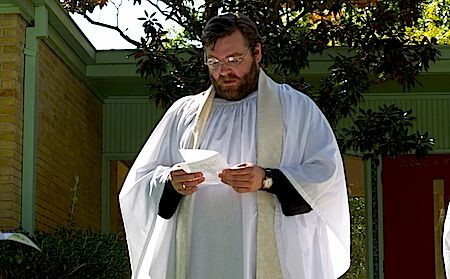Getting Ready for Sunday: The Rev. Will Brown

Many pertinent lessons have been extracted from the parable of Lazarus and the rich man (Luke 16:19-31). It has been read as a primer on the afterlife, a peek into the world beyond the grave, and about how things stand with the dead. In my own reading of this parable, and in my understanding of it, I have tended to emphasize its essential christocentricity – its pointing to Jesus – which comes out clearly in the last verse, where Abraham says of the five brothers of the rich man, still living in luxury and self-indulgence: “If they do not hear Moses and the prophets, neither will they be convinced if some one should rise from the dead,” (Luke 16.31). This is not really about ghosts; its about Jesus and the incredulity of many even in the face of his resurrection.
But the parable is also, clearly, about poverty and our attitude to it. This lesson is especially pertinent for 21st century Christians. Father Richard Finn, a Dominican friar at Blackfriars, Oxford, sees in this parable a critical commentary on what Charles Dickens called “telescopic philanthropy,” speaking of the character of Mrs. Jellaby from “Bleak House” – “a burning, all-consuming, passion to do good at great distance.”
This passion flourishes in our time, its flame fanned by the potential, literally at our fingertips, of social media. We do well to recall the raging indignation, and its real-world repercussions in the lives of individuals, attending the death of Cecil the Lion or Harambe the Gorilla. What would have been, twenty years ago, a minor headline in a single newspaper is picked up by virtual winds, and suddenly mob frenzy has gone viral, and everyone is an expert on wildlife conservation or Islam or gender theory or whatever cause du jour. It is now not even “philanthropy” as such that is “telescopic,” but the vagaries of benevolence and self-promotion.
But in the parable from Luke 16, Jesus says that Lazarus, full of sores, lay at the gate of the rich man. He is right there, a tangible, incarnate presence to be stepped around. Here is an implicit but sharp indictment of the ways we have structured our society, removing what is noxious to the margins, isolating and abstracting social problems such that our benevolence or outrage can be undertaken at a comfortable distance from the unpleasantnesses that might, after all, be communicable.
The upshot – the spiritual danger that this dynamic poses to us, who claim to be disciples of Jesus – is that we become ossified and self-confirmed. Commenting on the parable, St. Gregory the Great made much of the rich man’s purple robes and his feasting. He thus draws our attention to the fact that the root problem is not so much that Lazarus and others like him are ignored. That is a symptom of the real problems, the real sins, which are the rich man’s gluttony and pride, the taproot of spiritual disease. And his sins follow him to hell. Notice that in hell he won’t even address Lazarus, but speaks ABOUT him to Abraham, and seems still to regard Lazarus as a lackey: “Send Lazarus to dip the end of his finger in water and cool my tongue…!” (v. 24).
It would seem that hardness of heart has eternal consequences, that pride has a propensity to fossilize us forever. Thus our social propensity to abstract and marginalize our problems, to remove them to a distance at which they can be comfortably, unsacrificially engaged, poses enormous spiritual risk. It confirms us in our pride, and creates the illusion that our gluttony is, at worst, a victimless crime. When the sick and the poor are right in front of you, the task you face isn’t so much how outraged you will allow yourself to feel, but whether you will allow your heart to be broken and made new.


